Lemon pepper seasoning is a delightful blend that combines the zesty brightness of lemons with the aromatic kick of black pepper. Crafting your own “homemade lemon pepper recipe” allows you to tailor the flavours to your preference, ensuring a fresh and vibrant seasoning that will elevate your dishes to new levels of taste and complexity.
Whether you’re a seasoned chef or a cooking enthusiast, making your own lemon pepper at home is a simple and rewarding endeavour that will add a burst of citrusy goodness to a wide range of culinary creations.
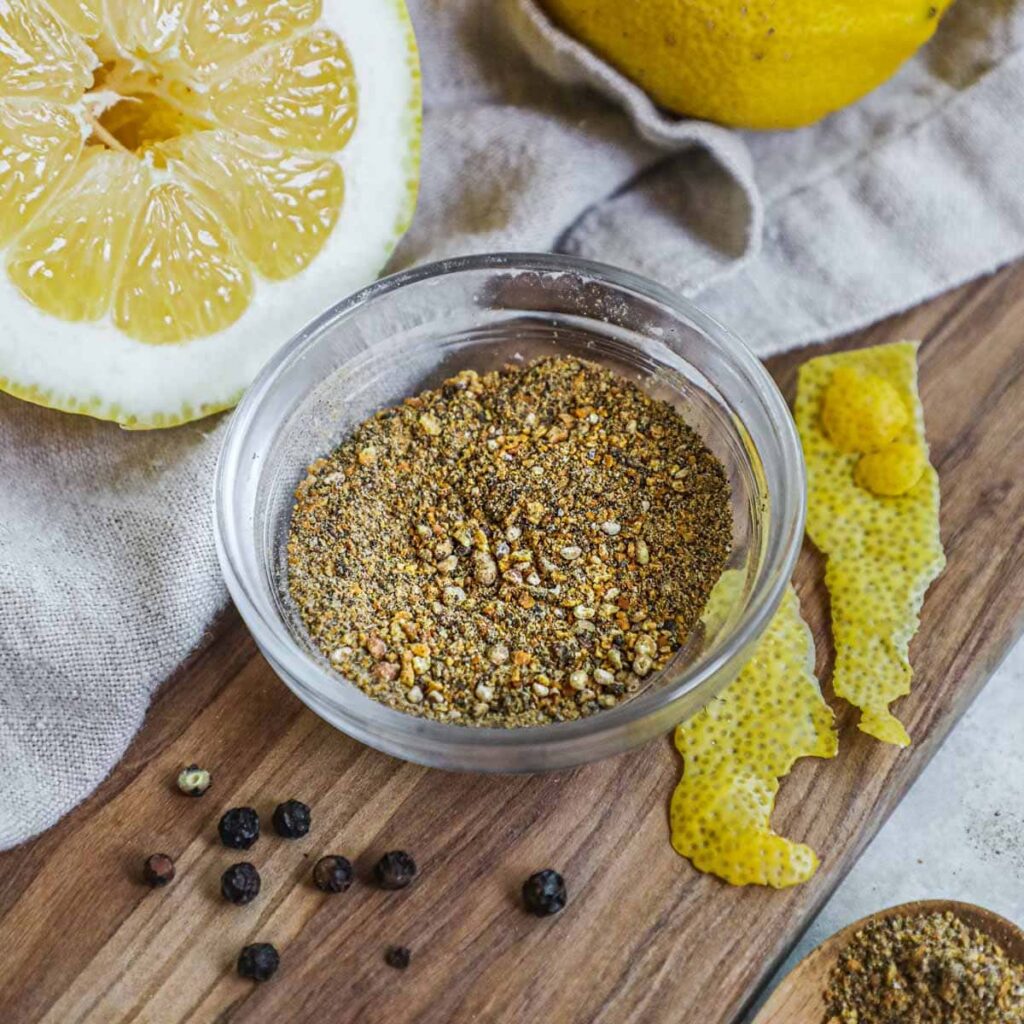
SEE ALSO:
- How to make pepper soup
- Chicken Soup Recipe
- Best Homemade German Chocolate Cake Recipe
- How to Make the Best Fluffy American Pancake Recipe
What is Lemon Pepper good for?
Lemon pepper is a versatile seasoning that combines the flavours of lemon zest and cracked black pepper. It can be used in a variety of dishes to add a bright, citrusy, and slightly spicy flavour. Lemon pepper can be used in any recipe calling for black pepper or recipes that benefit from a boost of zesty lemon flavour.
The blend is popular on fish and poultry dishes, specifically roasted or grilled chicken, salmon, and shellfish.
Also, the pepper used for lemon pepper is Black Pepper, which is rich in vitamins A and C, which can help boost the body’s immune system. Lemon zest is high in vitamin C and fibre, which helps to maintain a healthy digestive system.
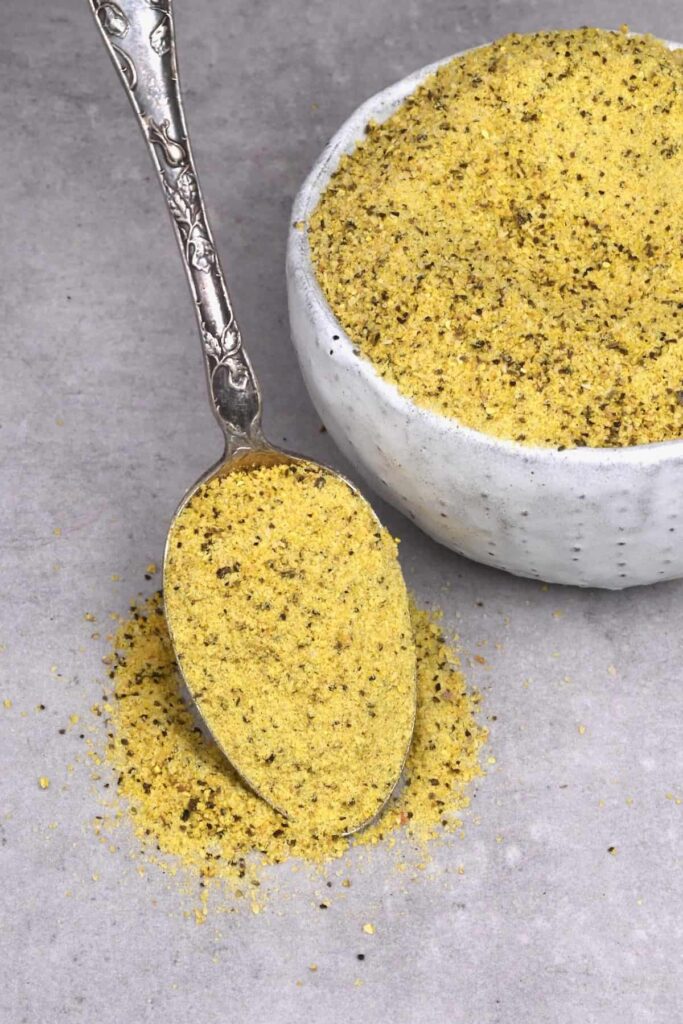
SEE ALSO: Lemon Drizzle Cake
What is Lemon Pepper made of?
Lemon pepper (also called lemon pepper seasoning) is a seasoning made from granulated lemon zest and cracked black peppercorns. The lemon zest is mashed with the pepper to allow the citrus oil to infuse into the pepper.
Ingredients
It typically contains a combination of the following ingredients:
- Black Pepper: Ground black pepper is a key component of lemon pepper seasoning, providing a spicy and pungent flavour.
- Lemon Zest: Lemon zest, which is the outermost layer of the lemon peel, is dried and ground to add a tangy and citrusy taste.
- Salt: Common table salt is often included to enhance the overall flavour and balance the spices.
- Dried Lemon Peel: Dried lemon peel is sometimes added to provide additional citrus flavour and aroma.
- Garlic Powder: Garlic powder is a common ingredient that adds a savoury and aromatic element to the seasoning blend.
- Onion Powder: Like garlic powder, onion powder contributes a savoury and slightly sweet taste to the mixture.
- Dried Thyme: Dried thyme is occasionally included to provide a herbal note that complements the citrus and pepper flavours.
- Dried Parsley: Dried parsley may be added to contribute a touch of freshness and colour to the seasoning.
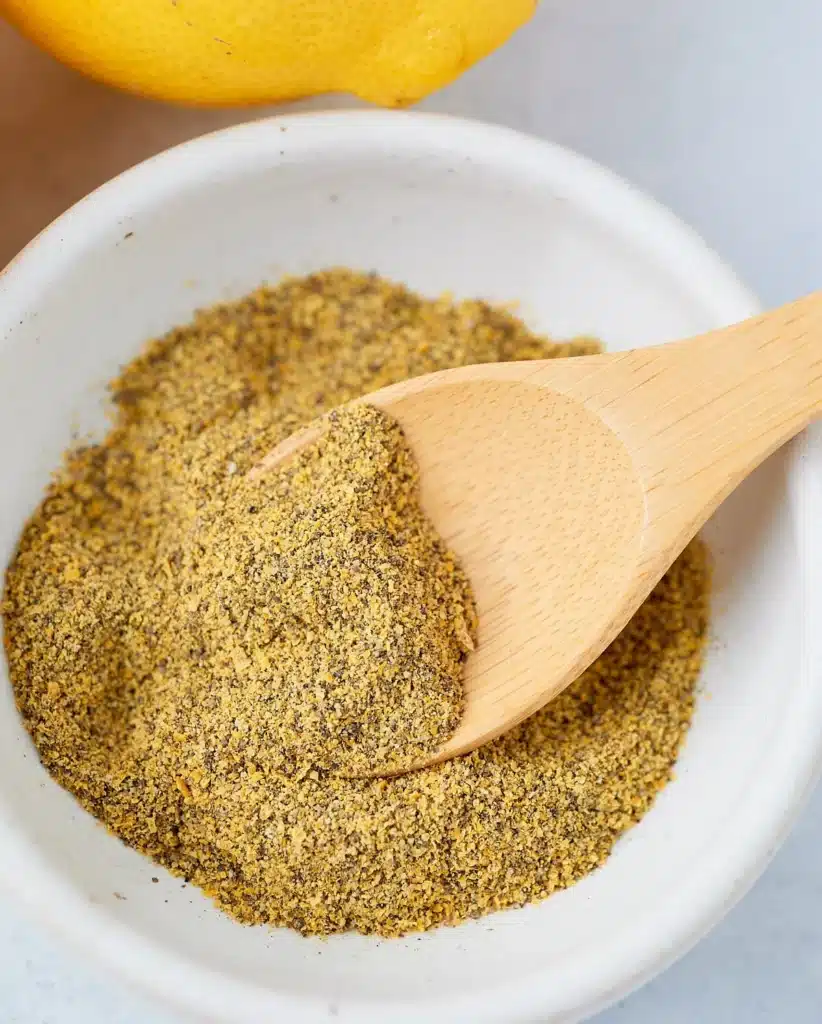
How to make Lemon Pepper
- To make a homemade lemon pepper seasoning, follow a simple method.
- Prepare the lemon zest by grating the outer yellow layer of fresh lemon. Spread the zest on a baking sheet and let it air dry for a few hours or until it becomes dry and crispy. Once dried, use a mortar, pestle, or spice grinder to grind the lemon zest into a fine powder.
- Combine the ground black pepper, salt, dried lemon peel, garlic powder, onion powder, dried thyme, and dried parsley in a mixing bowl. Adjust the amounts of each ingredient to your taste preferences.
- Using a whisk or spoon, thoroughly mix all the ingredients until they are well combined. Ensure that the lemon zest is evenly distributed throughout the mixture.
- Then transfer the lemon pepper seasoning to an airtight container or a spice jar with a tight-fitting lid. This will help preserve the flavours and keep the seasoning fresh for longer.
- Your homemade lemon pepper seasoning is now ready to use! Store it in a cool, dry place away from direct sunlight.
SEE ALSO: Chicken Lemon Pepper Recipe: (How to make the best Chicken Lemon Pepper)
Ways to Store Lemon Pepper Seasoning
Making your homemade lemon pepper seasoning is a fantastic way to elevate your culinary creations with zesty flavours. However, proper storage is essential to ensure that your seasoning remains fresh and flavoursome for an extended period. This blog post will guide you through the best practices for storing your homemade lemon pepper seasoning, ensuring its longevity and preserving its aromatic qualities.
1. Opt for an airtight container
To safeguard the freshness of your homemade lemon seasoning, transfer it to an airtight container or a spice jar with a tightly sealed lid. By preventing moisture and air from infiltrating the container, you can maintain the seasoning’s flavour and aroma for an extended period.
2. Choose a cool, dry storage location:
Look for a cool, dark, and dry area as the designated storage spot for your lemon pepper seasoning. It’s crucial to shield the seasoning from heat, light, and humidity, as these factors can compromise its flavours and reduce its shelf life. Steer clear of storing it near the stove or any other heat-emitting source.
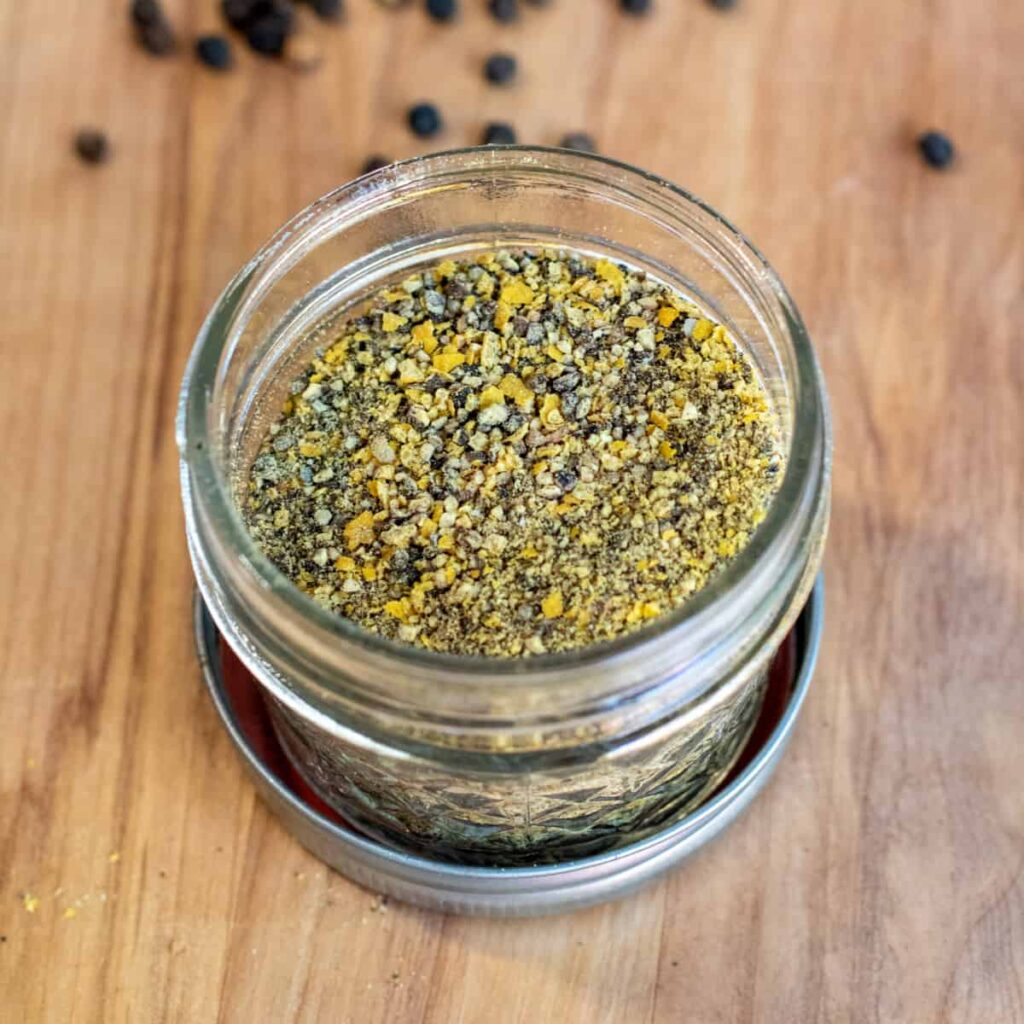
3. Shield from direct sunlight
Direct sunlight poses a significant risk to the potency and flavour of spices. Therefore, it’s imperative to locate a storage space that is shielded from direct sunlight. Consider utilizing a cupboard or pantry for this purpose, ensuring your homemade lemon pepper seasoning remains protected from harmful rays.
4. Avoid moisture
Moisture is the nemesis of spice blends, as it can lead to clumping and spoilage. Before transferring your seasoning, ensure that the container is completely dry. Additionally, keep it away from areas prone to high humidity, such as above the stove or near the sink. This precaution will help preserve the integrity of your lemon pepper seasoning.
5. Monitor freshness
Over time, spices gradually lose their flavours and aromatic properties. To stay on top of the freshness of your homemade lemon seasoning, consider labelling the container with the date of preparation. Generally, this seasoning can maintain its quality for up to 6 months. However, it is recommended to utilise the most vibrant and delightful flavours within 3 to 4 months.
6. Use Silica Gel Packs
Consider adding silica gel packs to the container if you live in a particularly humid area. Silica gel helps absorb excess moisture and keeps the seasoning dry.
7. Freezer Storage
If you’ve made a large batch and want to extend its shelf life, you can store lemon pepper seasoning in the freezer. Use a freezer-safe, airtight container that should stay fresh for several months.
8. Portion Control
If you’ve made a large batch but don’t plan to use it all at once, consider dividing the seasoning into smaller portions. This way, you can keep the main batch in storage while using smaller quantities that are more accessible.
9. Label the Container
Always label the container with the name of the seasoning and the date it was made. This helps you keep track of its freshness and prevents confusion with other spice blends.
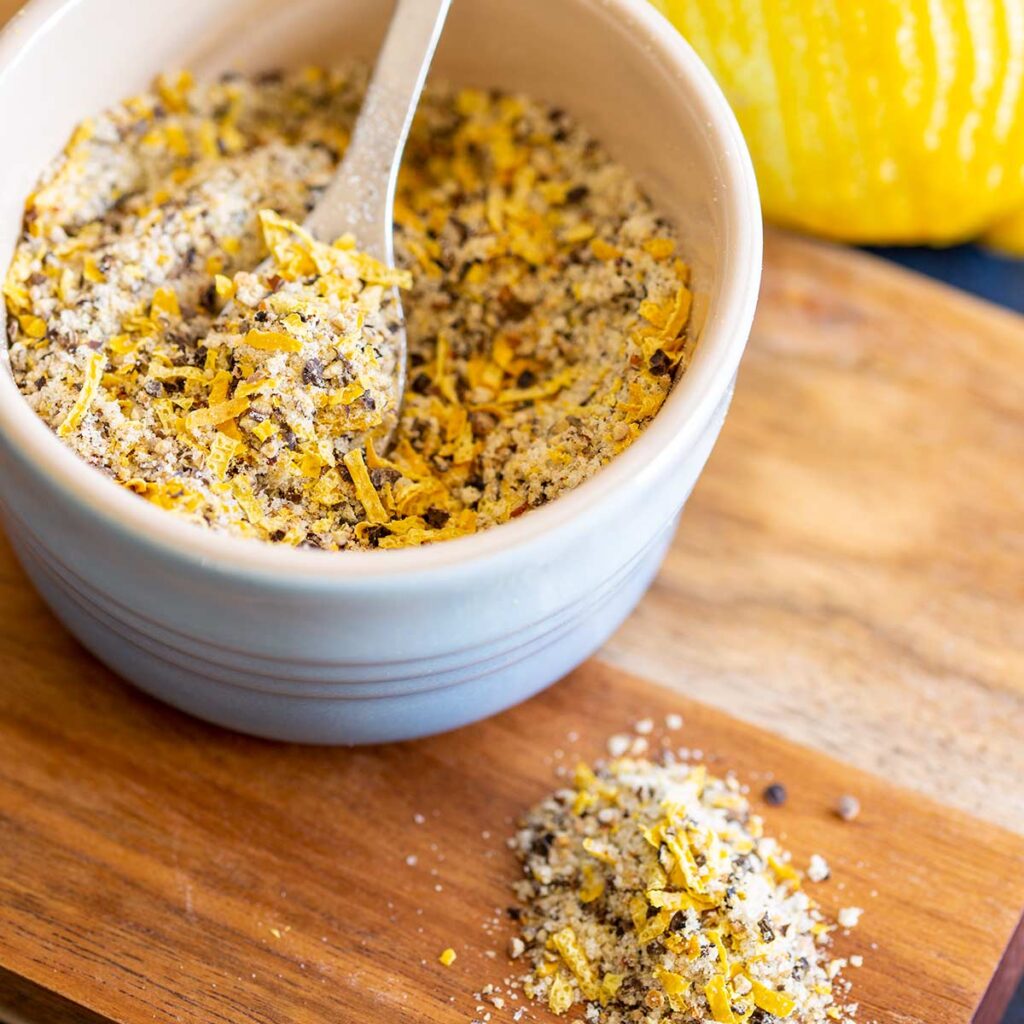
SEE ALSO: Simple Pineapple Cake Recipes to Bake in 30 Minutes
Ways to use Lemon Pepper Seasoning
Here are some popular uses for lemon pepper:
1. Seasoning for poultry
Lemon pepper is commonly used to season chicken, turkey, or other poultry dishes. It adds a tangy flavour that pairs well with the mild taste of poultry.
2. Seafood seasoning
Lemon pepper is also great for seasoning fish and seafood. It complements the natural flavours of seafood and gives it a refreshing taste.
3. Vegetable seasoning
Lemon pepper can be sprinkled over roasted or grilled vegetables to enhance their flavours. It adds a vibrant and citrusy kick to vegetables like asparagus, broccoli, or zucchini.
4. Salad dressing
Lemon pepper can be incorporated into homemade salad dressings to add a zingy flavour. It pairs well with olive oil, vinegar, and herbs to create a bright and tangy dressing for salads.
5. Marinade
Lemon pepper can be used as a component in marinades for meats and vegetables. Its citrusy notes help tenderize the meat and infuse it with flavour before cooking.
6. Seasoning for pasta and rice dishes
Lemon pepper can be added to pasta sauces, risotto, or rice dishes to give them a refreshing flavour.
SEE ALSO: How to Make Carrot and Coriander Soup
How long can I store Lemon Pepper Seasoning?
Homemade lemon pepper seasoning can keep for up to 6 months if you store it in an airtight jar and keep away from all sources of moisture, heat, and light. This means you cannot store it in your fridge. Just put it in a cool, dry, dark corner of your pantry shelf, and you should be fine.
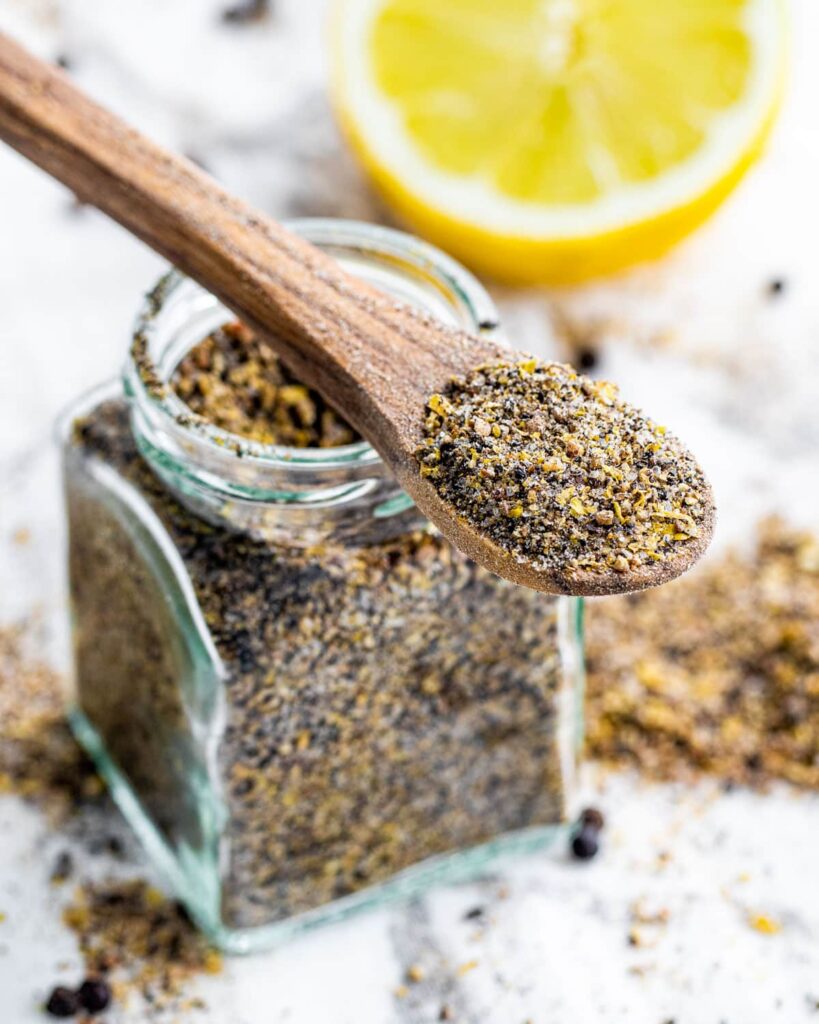
Other Spice to add to Lemon Pepper
If you’d like to add an extra kick or enhance the flavour of your homemade lemon pepper recipe, you can consider incorporating one or more of the following spices:
- Cayenne Pepper: For some heat, add a pinch or two of cayenne pepper.
- Paprika: Sweet or smoked paprika can add depth and a mild smoky flavour to your lemon pepper seasoning.
- Crushed Red Pepper Flakes: If you enjoy a bit of heat, crushed red pepper flakes will work perfectly.
- Dried Herbs: Experiment with dried herbs like thyme, oregano, basil, or rosemary. These can bring additional layers of flavour to your lemon pepper seasoning.
- Celery Seed: A touch of celery seed imparts a subtle earthy and herbal flavour with citrus and pepper profiles.
SEE ALSO:
- Browning Sauce Recipe: 7 Interesting Things To Know
- How Many Teaspoons Are in a Tablespoon
- Pumpkin Puree Recipe
FAQs About Lemon Pepper
Does lemon pepper have salt or sodium?
Yes, because lemon pepper seasoning is made with salt, it does contain sodium. You can omit the salt if you like and just add salt separately to your recipe as needed.
Does lemon pepper have sugar in it?
Nutrition Facts % Daily Value*
Sodium 290mg 13%
Total Carbohydrate 0g. 0%
Dietary Fiber 0g. 0%
Total Sugars 0g. 0%
What do lemon pepper and salt do for you?
Lemon juice, when mixed with pepper and salt, is known to provide a host of health benefits. These three ingredients can relieve your pain and inflammation. You can just take a teaspoon of lemon juice, add a pinch of pepper powder and half a pinch of salt, and consume it.
Conclusion
Lemon pepper is a versatile and delectable condiment that has found its way into the hearts and kitchens of innumerable foodies. Its distinct combination of zesty citrus notes and pungent black pepper produces a flavor symphony that takes meals to new heights. Lemon pepper gives a burst of brightness and complexity to any meal, whether used as a dry rub for meats, a seasoning for vegetables, or a simple addition to salads and soups.
Its worldwide popularity stems from its ability to complement a wide range of cuisines, from Mediterranean to Asian, and everything in between. As we continue to discover and appreciate the culinary world’s wonders, lemon pepper remains an indispensable tool for both professional chefs and home cooks alike, forever enriching the art of seasoning and adding a zestful charm to our eating experiences.
